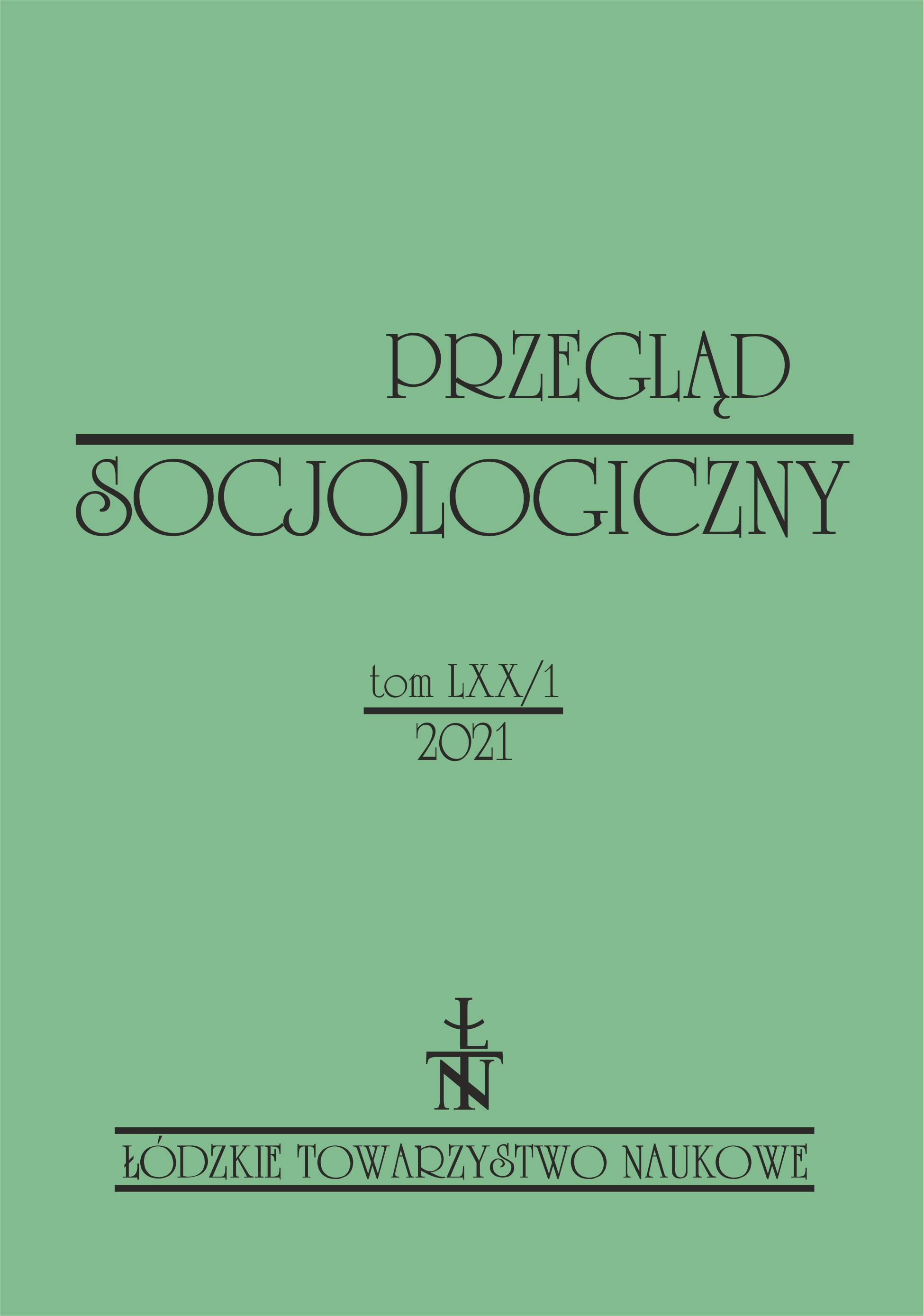Model rekursywny instytucjonalizacji w badaniu zjawiska bezgotówkowości – możliwości zastosowania
DOI:
https://doi.org/10.26485/PS/2021/70.1/4Słowa kluczowe:
instytucjonalizacja, społeczny skrypt, bezgotówkowość, mixed-methodAbstrakt
Niniejszy artykuł porusza problem wyzwań metodologicznych, przed jakimi stają badacze, którzy stawiają sobie za cel uchwycenie procesu instytucjonalizacji zjawiska ekonomicznego w dynamicznie zmieniającym się środowisku. Odnosząc się do wyników badań empirycznych nad stosunkiem małych i średnich przedsiębiorców w Polsce do płatności bezgotówkowych, artykuł omawia problem wyzwań metodologicznych badania instytucjonalizacji skryptu społecznego, według którego działa wielu aktorów społecznych z różnych pól organizacyjnych. Artykuł wpisuje się w neoinstytucjonalny program badań nad instytucjami w sferze gospodarki i przedstawia koncepcję wykorzystania modelu rekursywnego instytucjonalizacji autorstwa Barleya i Tolbert [1997] do projektu badania procesu kształtowania się zjawiska bezgotówkowości w gospodarce.
Bibliografia
Alvesson Mats, André Spicer. 2019. “Neo-institutional theory and organization studies: A midlife crisis?”. Organization Studies 40(2): 199–218.
Arvidsson Niklas. 2019. The future of cash in Sweden. In: Building a cashless society. Springer briefs in economics, N. Arvidsson, 75–84. Cham: Springer. https://doi.org/10.1007/978-3-030-10689-8_8.
Barley Stephen R., Pamela S. Tolbert. 1997. “Institutionalization and structuration: Studying the links between action and institution”. Organization Studies 18(1): 93–117.
Bátiz-Lazo Bernardo, Thomas Haigh, David L. Stearns. 2014. “How the future shaped the past: The case of the cashless society”. Enterprise & Society 15(1): 103–131.
Berger Peter, Thomas Luckmann. 2016. The social construction of reality. In: Social theory re-wired: New connections to classical and contemporary perspectives. Second edition, W. Longhofer, D. Winchester (eds.), 116–122. London: Routledge.
Creswell John W. 2009. Research design. Qualitative, quantitative and mixed-methods approaches. London: Sage Publications
Czarniawska Barbara. 2009. “Emerging institutions: Pyramids or anthills?”. Organization Studies 30(4): 423–441.
DiMaggio Paul. 1988. Interest and agency in institutional theory. In: Institutional patterns and organizations: Culture and environment, L. Zucker (ed.), 3–21. Cambridge, Massachusetts: Ballinger Publishing.
DiMaggio Paul, Walter Powell. 1983. “The iron cage revisited: Institutional isomorphism and collective rationality in organizational fields”. American Sociological Review 48(2): 147–160.
Granovetter Mark. 2017. Society and economy: Framework and principles. Massachusetts: Harvard University Press.
Hall Peter A., Rosemary C.R. Taylor. 1996. “Political science and the three new institutionalisms”. Political Studies XLIV: 936–957.
Ingram Paul, Karen Clay. 2000. “The choice-within-constraints new institutionalism and implications for sociology”. Annual Review of Sociology 26: 525–546.
Jepperson Ronald L. 1991. “Institutions, institutional effects, and institutionalism”. In: The new institutionalism in organizational analysis, W.W. Powell, P.J. DiMaggio (eds.), 143–163. Chicago: The University of Chicago Press.
Jose Anita, Mary S. Thibodeaux. 1999. “Institutionalization of ethics: The perspective of managers”. Journal of Business Ethics 22(2): 133–143.
Mair Johanna, Georg Reischauer. 2017. “Capturing the dynamics of the sharing economy: Institutional research on the plural forms and practices of sharing economy organizations”. Technological Forecasting and Social Change 125: 11–20.
Narodowy Bank Polski. 2020. Informacja o kartach płatniczych I kwartał 2020 r. Warszawa.
Nee Victor. 1998. Sources of the new institutionalism. In: The new institutionalism in sociology, M.C. Brinton i V. Nee (eds.), 1–16. New York: Russel Sage Foundation.
North Douglass C. (1991). “Institutions”. Journal of Economic Perspectives 5(1): 97–112.
Ostrom Elinor. 1990. Governing the commons. The evolution of institutions for collective action. New York: Cambridge University Press.
Ostrom, Elinor. 2011. “Background on the institutional analysis and development framework”. Policy Studies Journal 39(1): 7–27.
Onwuegbuzie Anthony. J., Charles Teddlie. 2003. “A framework for analyzing data in mixed methods research”. In: Handbook of mixed methods in social and behavioral research, A. Tashakkori, C. Teddlie (eds.), 351–383. Thousand Oaks, CA: Sage Publications.
Pawlak Mikołaj, Łukasz Srokowski. 2014. „Instytucje i organizacje: Przekraczanie paradygmatów w badaniach nad organizacjami”. W: Pomiędzy i wewnątrz: Instytucje, organizacje i ich działania, M. Pawlak i Ł. Srokowski (red.), 7–31. Warszawa: IPSiR UW.
Polasik Michał. 2015. „Stan i potencjał rozwoju sieci akceptacji kart płatniczych w Polsce”. Acta Universitatis Nicolai Copernici. Ekonomia XLVI(1): 23–58.
Sadowski Ireneusz. 2014. „Współczesne spojrzenie na instytucje: Ewolucja pojęć, problem modelu aktora i poziomy analizy instytucjonalnej”. Przegląd Socjologiczny LXIII(3): 89–114.
Scott Richard. 1995. Institutions and organizations: Ideas, interests, and identities. Los Angeles, CA: Sage Publications.
Sillince John A.A., James R. Barker. 2012. “A tropological theory of institutionalization”. Organization Studies 33(1): 7–38.
Symon, Gillian, Anna Buehring, Phil Johnson, Catherine Cassell. 2008. “Positioning qualitative research as resistance to the institutionalization of the academic labour process”. Organization Studies 29(10): 1315–1336.
Szalacha-Jarmużek Joanna, Michał Polasik, Marta Jakubowska. 2020 [w druku]. The institutionalization of “cashless Poland”: Values, norms, sanctions and grand narrations in the SMEs’ perspective on the adoption of cashless payments.
Sztompka Piotr. 2004. Socjologia. Kraków: Znak.
Tashakkori Abbas, Charles Teddlie. 2010. “Overview of contemporary issues in mixed methods research”. In: Sage handbook of mixed methods in social & behavioral research, A. Tashakkori, C. Teddlie (eds.), 1–41. Los Angeles, CA: Sage Publications.





